Digital transformation and its real world impact
/Digital_MAIN_PIC_1.jpg)
With digital transformation as a key tool in the fight against climate change, it was naturally high on the agenda at IASP Seville. From digital technologies that help us understand where we are and where we need to get to, to strategies that help companies and communities keep up with the digital revolution, speakers and experts explored the multifaceted impact of digital change.
The acceleration of digital transformation
Keynote speaker Sergio Oslé, president of Movistar + and COO of Telefonica Spain, kicked off the digital theme with perspectives on the new phase of digitalisation and the exponential rate of takeup of new technology, from 75 years for a global population to adopt the telephone in the early 20th century, to 7 days to adopt Zoom during the pandemic. With a look at the metaverse and 5G that goes “beyond speed”, he shared his insights on a digital future connecting both people and devices. Other corporate and external perspectives came from Oracle's Paola Simonian, Isaac Perez Fafian from Airbus and Gonzalo Delacámera of IE University, in a panel that considered the energy footprint of data, the future of aviation and the need for collective action to meet the huge challenges of climate change.
Digital goes real world
Of course, digital transformation doesn't only happen on a screen. We learned about smart cities and smart district working in Japan, Brazil, Pakistan and Thailand that once again combine the digital with the real-world; about new mobility solutions that bring about behavioural change with new technologies – gamification to accelerate the adoption of sustainable transport, and using data to understand community needs.
Increased digitalisation also brings human challenges: not everyone has equal access to the online space and the skills and employment opportunities it offers. A panel on future-proof jobs and upskilling shared examples from London, UK and Recife, Brazil on how innovation ecosystems are helping disadvantaged population achieve the education they need to participate in the new digital economy, how Sweden is using lifelong learning to narrowing the digital skills gap in the market, and insights on recruiting and retaining the Gen Z digital workforce in China and ASEAN. Questions from the audience highlighted that it’s not just young people with digital skills their companies need, but also experienced managers with real-world workplace competencies and the ability to collaborate.
Digital innovation supporting collaboration
Collaboration went hand in hand with digitalisation: after all, digitalisation isn’t an end in itself, but a means to help people work more effectively together, share resources more efficiently, and connect remotely. That’s another reason STPs and AOIs are helping their companies and communities to go digital.
Digital platforms have a key role to play in enabling startups and corporates to work together and learn from each other. B2B matchmaking events aren’t new, but STPs and AOIs are going about them in new ways, helping big and small companies to make a personalised connection.
Helping companies and communities go digital
A greener society needs greener companies, many of whom use digital innovations to tackle the climate crisis. Deeptech is a sector with a long lab to market cycle, making it challenging for them to find investors, and IASP Seville heard about new approaches to supporting them at European level and connecting them with corporates and investors. Accelerators also offer increasingly individualised support: “You can’t just put them in a room and close the door and say, it’s a match,” said Rawad Chammas about the A2 Accelerator at Berlin Adlershof, emphasising the need for collaboration to meet the biggest challenges.
IASP Seville also heard how parks are helping companies increase the use of AI in unexpected sectors like agriculture, where it can assess livestock health, as well as in long distance drones, pre school teaching platform, supermarket product placement. Innovation programmes like Ignite Sweden are helping companies bring digital products to the market that can map and reduce heat loss in commercial and industrial buildings, and use big data to understand community needs. Collaborations between startups, corporates and the STPs and AOIs supporting them have been key to all these digital success stories.
As IASP Vice President Lena Miranda observed in the closing panel, it’s not tech that’s solving our problems worldwide, it’s the way people come together and collaborate to find solutions.
And that, we hope, is what IASP conferences help them to do.
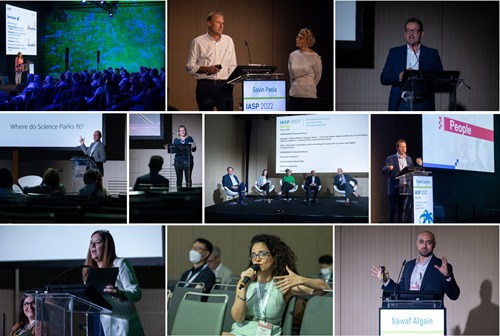
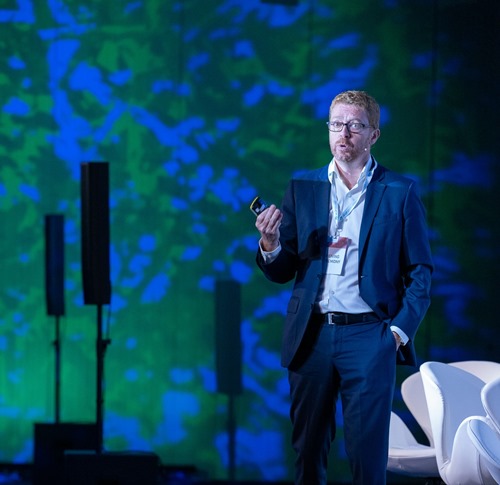
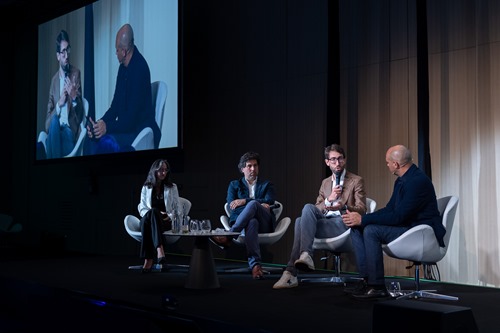
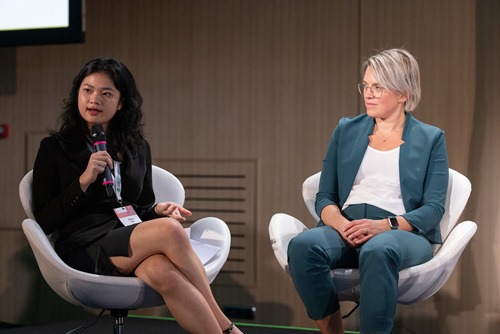
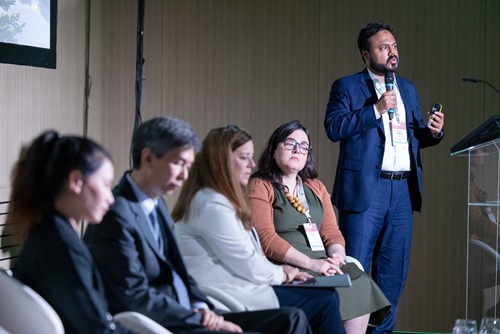
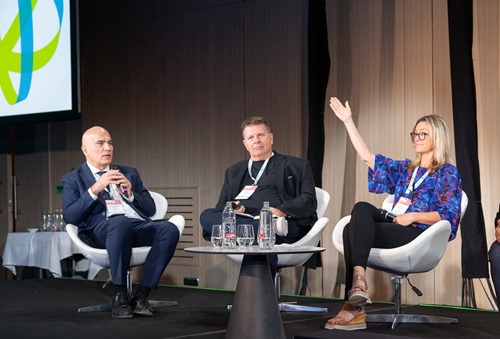
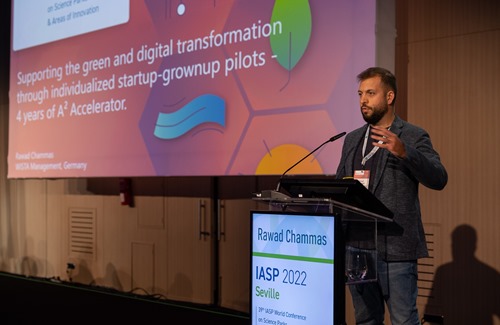
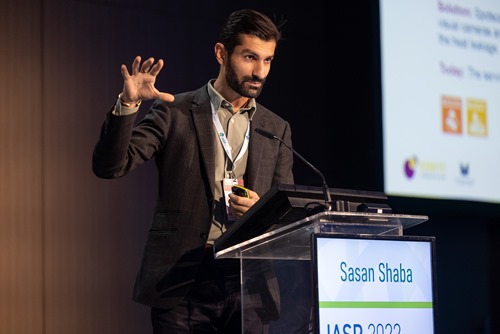
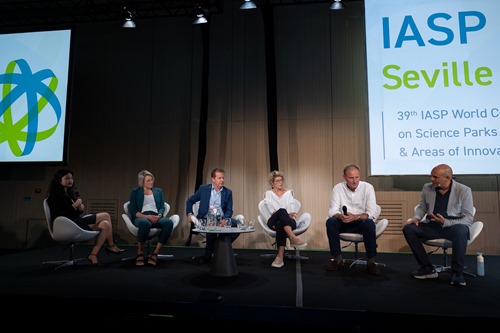
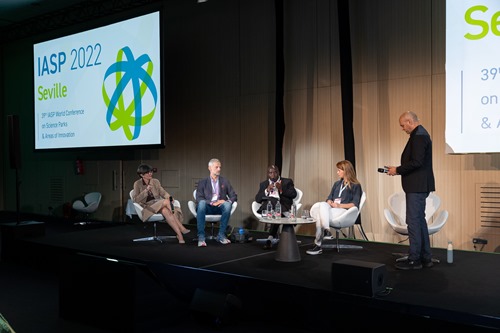
/)

/canvascolor(0xffffffff)/Identificador_Visual.png)
/canvascolor(0xffffffff)/rs_ystp-logo-en-high-02.png)
/canvascolor(0xffffffff)/2025_09_16_Sweden_Medeon_SP.png)
/canvascolor(0xffffffff)/acronimo_nombre3l_6.jpg)
/canvascolor(0xffffffff)/JOIST_Innovation_Park_Logo_-_White_1.png)
/canvascolor(0xffffffff)/Logo_UO_4.jpg)
/canvascolor(0xffffffff)/Yothi_Medical_Innovation_Disctrict.jpg)
/canvascolor(0xffffffff)/Logo_22.png)
/canvascolor(0xffffffff)/2017_08_07_HHTP.png)
/canvascolor(0xffffffff)/2020_10_23_Spain_Malaga_TechPark_PTA.jpg)
/canvascolor(0xffffffff)/2017_08_04_Eindhoven.png)
/canvascolor(0xffffffff)/HIPB_Logo_2.jpg)
/canvascolor(0xffffffff)/BV_Logo_HS_1.png)
/canvascolor(0xffffffff)/MemberLogo-83001-342701.png)
/canvascolor(0xffffffff)/PCT-GUAM_-LOGO-NORMAL_1.png)
/canvascolor(0xffffffff)/tartu-science-park_eng_land_rgb.jpg)
/canvascolor(0xffffffff)/UNIVERSITY_LOGO_page1_image1_1.jpg)
/canvascolor(0xffffffff)/Clipboard-2.jpg)
/canvascolor(0xffffffff)/atap_logo.png)
/canvascolor(0xffffffff)/2023_06_08_Australia_Melbourne_Innovaiton_District.jpg)
/canvascolor(0xffffffff)/Future_Metals_Technoparks.jpg)
/canvascolor(0xffffffff)/logo_tracom-1_1.png)
/canvascolor(0xffffffff)/2024_04_24_UK_UNIP.jpg)
/canvascolor(0xffffffff)/2017_11_15_Slovekia_CEPIT.jpg)
/canvascolor(0xffffffff)/2024_12_10_Canada_Entreprendre_Sherbrooke_Logo.png)
